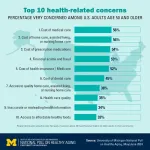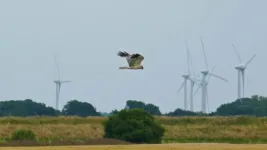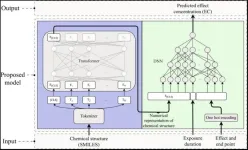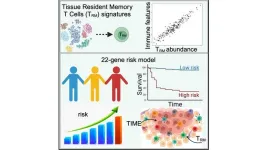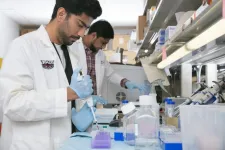Zoology: First report of wound treatment by a wild animal using a medicinal plant
2024-05-02
A wild male Sumatran orangutan (Pongo abelii) has been observed applying chewed leaves from Akar Kuning (Fibraurea tinctoria) — a climbing plant used in traditional medicine to treat wounds and conditions such as dysentery, diabetes, and malaria — to a wound on his cheek. The findings, which are published in Scientific Reports, represent the first report of suspected wound treatment by a wild animal using a plant with known medicinal properties.
Prior to this study, multiple ...
Longer interval between first colonoscopy with negative findings for colorectal cancer and repeat colonoscopy
2024-05-02
About The Study: This cohort study found that for the population without a family history of colorectal cancer (CRC), the 10-year interval between colonoscopy screenings for individuals with a first colonoscopy with findings negative for CRC could potentially be extended to 15 years. A longer interval between colonoscopy screenings could be beneficial in avoiding unnecessary invasive examinations.
Authors: Mahdi Fallah, M.D., Ph.D., of the German Cancer Research Center in Heidelberg, is the corresponding ...
Smoking cessation after initial treatment failure with varenicline or nicotine replacement
2024-05-02
About The Study: For individuals who smoked but did not achieve abstinence after treatment with varenicline, increasing the dosage enhanced abstinence versus continuing, whereas for nonabstainers initially treated with combined nicotine replacement therapy, a dosage increase or switch to varenicline enhanced abstinence and may be viable rescue strategies.
Authors: Paul M. Cinciripini, Ph.D., of the University of Texas MD Anderson Cancer Center in Houston, is the corresponding author.
To access the embargoed study: Visit our For The Media website at this link https://media.jamanetwork.com/
(doi:10.1001/jama.2024.4183)
Editor’s Note: Please see the article ...
How the brain’s arousal center helps control visual attention too
2024-05-02
The locus coeruleus (LC) is a small region of the brainstem that produces norepinephrine, a chemical with powerful effects on arousal and wakefulness which plays an important role in the body’s response to stress or panic. Now, research from the University of Chicago shows it plays a specific role in visual sensory processing as well.
In a new study published in Neuron, neuroscientists artificially increased neuronal activity in the LC by briefly shining light on genetically modified neurons. They saw that this manipulation selectively enhanced performance in non-human primates performing a visual attention task, underscoring the crucial role that attention plays in sensory ...
Increasing doses of varenicline or nicotine replacement helps persistent smokers quit
2024-05-02
HOUSTON ― For most smokers, quitting on the first attempt is likely to be unsuccessful, but a new study from The University of Texas MD Anderson Cancer Center found patients were more likely to quit if their cessation regimen was altered and doses were increased. Researchers also found that varenicline, a cessation medication, was more effective than combined nicotine replacement therapy (CNRT), such as patches or lozenges.
The study, published today in JAMA, revealed smokers who failed to quit with varenicline in the trial’s first phase were seven times more likely to quit by the end of the second phase if varenicline ...
Artificial intelligence yields promising results for advancing coronary angiography
2024-05-02
Long Beach, Calif. – May 2, 2024 – New insights from the AI-ENCODE study showed artificial intelligence (AI) successfully allowed the automated extraction of key functional and physiological data from routine angiograms. The late-breaking results were presented today at the Society for Cardiovascular Angiography & Interventions (SCAI) 2024 Scientific Sessions.
Coronary angiography is a widely used diagnostic procedure for identifying coronary artery disease (CAD), performed in over one million patients annually in the United States. Currently, data extracted from coronary angiograms are confined to detecting blockages in the coronary arteries. However, AI technology ...
Non-fasting pre-procedural strategy for cardiac catheterization significantly improved patient well-being and satisfaction
2024-05-02
Long Beach, Calif. – May 2, 2024 – New data from the CALORI Cardiac Catheterization trial shows significant improvement in patient well-being and satisfaction without compromising safety after implementation of a liberal non-fasting strategy prior to a cardiac catheterization procedures. The late-breaking results were presented today at the Society for Cardiovascular Angiography & Interventions (SCAI) 2024 Scientific Sessions.
More than one million cardiac catheterizations are performed each year in the U.S. to diagnose heart problems. The risk of complications ...
Gene therapy treatment increasing body’s signal for new blood vessel growth shows promise
2024-05-02
Long Beach, Calif. – May 2, 2024 – Final 12-month data from the EXACT trial demonstrates safety and efficacy results for a vascular endothelial growth factor (VEGF) gene therapy treatment for patients who have advanced coronary artery disease (CAD). The late-breaking results were presented today at the Society for Cardiovascular Angiography & Interventions (SCAI) 2024 Scientific Sessions.
CAD, also known as coronary heart disease or ischemic heart disease, affects about 20.5 million U.S. adults – making it the most common type of heart disease in the ...
Novel score system accurately identifies lesions reducing risk of PCI complications
2024-05-02
Long Beach, Calif. – May 2, 2024 – New data demonstrated that a left main (LM) bifurcation-specific novel scoring system (LM V-RESOLVE), based on three simple baseline angiographic findings, could help to rapidly discriminate lesions at risk of side branch (SB) occlusion during LM bifurcation percutaneous coronary intervention (PCI) – reducing risk during the procedure. The results from the prospective trial were presented today as late-breaking science at the Society for Cardiovascular Angiography & Interventions (SCAI) ...
Women need better treatments for bacterial vaginosis
2024-05-02
BALTIMORE, May 2, 2024: Bacterial Vaginosis (BV) affects about one-quarter of reproductive-age women and is linked to adverse health outcomes, such as increased HIV risk. Yet for decades, BV treatment in the United States has largely relied on antibiotics, and BV recurrence is common following antibiotic therapy.
Now, two European clinical trials have shown limited success with a different type of medication used to treat BV called dequalinium chloride (DQC). DQC—an antiseptic—has been in use for several decades in countries throughout Europe as an alternative treatment for BV. It is not currently approved by the U.S. ...
Webb telescope probably didn’t find life on an exoplanet — yet
2024-05-02
Recent reports of NASA’s James Webb Space Telescope finding signs of life on a distant planet understandably sparked excitement. A new study challenges this finding, but also outlines how the telescope might verify the presence of the life-produced gas.
The UC Riverside study, published in the Astrophysical Journal Letters, may be a disappointment to extraterrestrial enthusiasts but does not rule out the near-future possibility of discovery.
In 2023 there were tantalizing reports of a biosignature gas in the atmosphere of planet K2-18b, ...
Radial arterial access found superior to femoral access in percutaneous coronary intervention
2024-05-02
Long Beach, Calif. – May 2, 2024 – New data demonstrate the superiority of radial arterial access compared to femoral arterial access for coronary interventions. Findings showed radial access was associated with lower rates of in-hospital mortality, major access bleeding, and other major vascular complications compared with femoral access. The late-breaking results were presented today at the Society for Cardiovascular Angiography & Interventions (SCAI) 2024 Scientific Sessions.
Historically, femoral arterial access, through the groin, for percutaneous coronary intervention (PCI) was the standard. Radial access, or ...
Money on their minds: Health-related costs top older adults’ concerns for people their age, poll finds
2024-05-02
From medical and dental care to medications, insurance and nursing homes, health-related costs weigh heavily on the minds of older Americans of all backgrounds, a new poll suggests.
Asked to rate their level of concern about 26 different health-related topics for people over 50 in their community, five of the six issues that the most people cited as very concerning involved health costs.
The sixth – financial scams and fraud – also had to do with money.
Those same six topics rose to the top no matter what ...
To bend the curve of biodiversity loss, nature recovery must be integrated across all sectors
2024-05-02
The alarming rates of biodiversity loss worldwide have made clear that the classical way of governing biodiversity recovery based on protected areas and programmes for the protection of endangered species is not enough. To tackle this, almost 200 countries committed to the active ‘mainstreaming’ or integration of biodiversity targets into policies and plans across relevant sectors. However, research led by Utrecht University and UFZ Helmholz Centre for Environmental Research suggests that this has until now been largely ineffective due to non-binding commitments, ...
Singapore study identifies immunity threshold for protection against COVID-19 in children
2024-05-02
As COVID-19 becomes endemic, an important group of people who continue to require vaccination is future birth cohorts of children. Yet, in the face of ever-changing variants, as well as the waning of antibodies with time after each dose, key questions remain: What is the threshold of immune response against SARS-CoV-2 needed to protect against COVID-19 and how many doses of mRNA vaccination are required to reach that threshold?
Researchers answered this question in a joint study conducted by the NUS Yong Loo Lin School of Medicine (NUS Medicine) and Duke-NUS Medical School. With parental consent ...
National incidence of heart attacks decline 50% since 2004, yet underrepresented groups remain at highest risk
2024-05-02
People with Lower Income and Pre-Existing Conditions at Greater Risk of STEMI in the United States
Women, Black, and Hispanic Patients Up to 25% Less Likely to Receive Treatment for Heart Attacks Compared Men and White Patients
Long Beach, Calif. – May 3, 2024 – New data focusing on heart attack, specifically ST‐segment–elevation myocardial infarction (STEMI), uncovered socio-economic, racial, and gendered disparities associated with greater risk and are less likely to receive certain procedures. The data were presented today at the Society for Cardiovascular Angiography & Interventions (SCAI) 2024 Scientific Sessions.
STEMI, caused by ...
TAVR is associated with lower in-hospital complications in patients with aortic stenosis and cardiogenic shock compared to SAVR
2024-05-02
Long Beach, Calif. – May 4, 2024 – A nationwide observational analysis of patients with aortic stenosis (AS) and cardiogenic shock (CS) who underwent transcatheter aortic valve replacement (TAVR) or surgical aortic valve replacement (SAVR) determined that patients who underwent TAVR had lower in-hospital complications and resource utilization compared with SAVR. The results were presented today at the Society for Cardiovascular Angiography & Interventions (SCAI) 2024 Scientific Sessions.
As many as 300,000 people in the United States are diagnosed with AS every year. It predominantly affects those ...
New studies reveal underrepresentation of women and Hispanic population in the treatment of peripheral artery disease
2024-05-02
Hispanic Population Largely Remains Underrepresented in Studies of Treatment Devices for PAD Despite Being Dominant Minority Population Affected by PAD
Studies Evaluating Usage of Drug-Coated Balloon for PAD Include Disproportionate Amount of Women by One-Third Compared to Men
Analysis Shows 51% of PAD Cases Involve Women Despite Experiencing Less Severe Outcomes
Long Beach, Calif. – May 4, 2024 – New study findings underscore gaps in clinical trial representation of women and Hispanics for peripheral artery disease (PAD) and chronic limb-threatening ...
Empire Discovery Institute receives commercial funding award from the National Multiple Sclerosis Society
2024-05-02
ROCHESTER, NY, May 2, 2024 – Empire Discovery Institute (EDI) has entered into a collaborative research partnership with the National Multiple Sclerosis Society and its commercial development program Fast Forward, LLC. Through a competitive application and review process, EDI was awarded $791,933 from Fast Forward along with technical support from its network of key opinion leaders in multiple sclerosis (MS) who will help contribute to the advancement of EDI’s technology.
Fast Forward provides research funding to commercial entities who develop promising new therapies for the treatment of MS, a demyelinating disease of the central nervous system impacting ...
Nicola Fuchs-Schündeln to become the new President of the WZB Berlin Social Science Center
2024-05-02
The shareholders' meeting of the WZB has appointed Nicola Fuchs-Schündeln as the institute's future president. She succeeds Jutta Allmendinger, who has headed the institute since 2007. Nicola Fuchs-Schündeln is Professor of Macroeconomics and Development at Goethe University Frankfurt. The handover of office will take place on September 4, 2024 at the WZB.
Nicola Fuchs-Schündeln is a nationally and internationally renowned scientist who returned to Germany in 2009 after several years at Yale and Harvard. Since then, ...
Toxic chemicals can be detected with new AI method
2024-05-02
Swedish researchers at Chalmers University of Technology and the University of Gothenburg have developed an AI method that improves the identification of toxic chemicals – based solely on knowledge of the molecular structure. The method can contribute to better control and understanding of the ever-growing number of chemicals used in society, and can also help reduce the amount of animal tests.
The use of chemicals in society is extensive, and they occur in everything from household products to industrial processes. Many chemicals reach our waterways and ecosystems, where they may cause negative effects on humans and other ...
The people who are most active on social media are also the most active offline
2024-05-02
Parents often worry about the use of social media among children and young people. Caring about this is a good thing, and there are several reasons why you should pay attention, but there is one thing that parents needn’t worry about: young people spending time on social media does not impair their interaction with friends offline, according to a new study.
“On the contrary, we find that people who use social media a lot spend more time with friends offline,” says Professor Silje Steinsbekk at the Norwegian University of Science and Technology (NTNU’s) Department of Psychology.
The results are ...
Climate is one culprit in spread and growth of dust in Middle East
2024-05-02
Climate change is transforming dust storms—a natural phenomenon in the Middle East—into a more frequent and widespread threat to health and economies throughout the region, a new study shows.
Dust levels have increased in many parts of the Middle East chiefly due to global warming, but other human activities also share credit, says Zahra Kalantari, associate professor at KTH Royal Institute of Technology. She cites such factors as oil extraction, military conflicts and lack of cross-border ...
Gene signatures from tissue-resident T cells as a predictive tool for melanoma patients
2024-05-02
(LOS ANGELES) – May 2, 2024 - An extensive analytical study conducted at the Terasaki Institute for Biomedical Innovation (TIBI) has revealed an association between favorable survival outcomes for melanoma patients and the presence of higher populations of tissue-resident memory T cells (TRM). Data obtained from this study could be used not only for a TRM-based machine learning model with predictive powers for melanoma prognosis but could also elucidate the role TRM cells can play in the tumor immune microenvironment. This could guide the development of more effective and personalized anti-tumor immunotherapeutic treatment regimens for cancer ...
FAU creates new Department of Biomedical Engineering
2024-05-02
In recognition of a rapidly growing field, Florida Atlantic University’s College of Engineering and Computer Science (COECS) has created a Department of Biomedical Engineering. The newly established department will focus on three key areas: biomaterials and tissue engineering; smart health systems; and bio-robotics. Biomedical engineering integrates fundamental and practical concepts in electrical and mechanical engineering, biology, computer science and medicine into a cross-disciplinary field focused on improving human health and solving problems in the delivery of health care.
The COECS faculty are already performing ...
[1] ... [1161]
[1162]
[1163]
[1164]
[1165]
[1166]
[1167]
[1168]
1169
[1170]
[1171]
[1172]
[1173]
[1174]
[1175]
[1176]
[1177]
... [8785]
Press-News.org - Free Press Release Distribution service.







